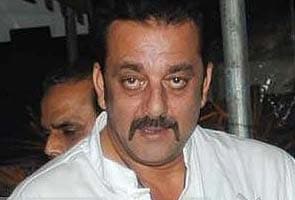
New Delhi:
The Central Bureau of Investigation (CBI) told the Supreme Court today that actor Sanjay Dutt's conviction under Arms Act in connection with the 1993 Mumbai blasts case and his six-year jail term should be upheld. However, the investigating agency maintained its earlier stand and it did not press for more stringent charges to be invoked against him.
Mr Dutt was arrested after the blasts in 1993 and spent 18 months in jail before being granted conditional bail. In 2007, he was convicted by a Special Terrorist and Disruptive Activities Act (TADA) court for illegally possessing a 9 mm pistol and an AK-56 rifle but was acquitted of more serious charges under the now defunct TADA law. The actor was sentenced to six years in jail. In August 2007, he moved the Supreme Court challenging his conviction, and sought bail. He was granted bail in November 2007.
In the court today, the CBI said the actor's conviction under Arms Act and his six-year sentence should be upheld. However, it did not challenge the TADA court order that acquitted him of terror charges. The investigating agency conveyed this to the top court today while hearing other appeals filed by the accused.
Earlier this month, the Supreme Court had asked the actor about the extent of his contact with underworld don Dawood Ibrahim, who is wanted in India for the terror attack in Mumbai. Replying to the query, his lawyer informed the court that Mr Dutt had only attended a dinner in Dubai hosted by Dawood before the Mumbai terror attack.
"I have only attended a dinner at Dawood's house along with two film producers which was before the blast. Other than that I do not have any relationship," he said on behalf of the Bollywood star.
The CBI maintains that before the attack, Dawood's gang members had delivered AK-56 rifles, a 9 mm pistol and grenades to Mr Dutt's home, and that he returned these a few days later, but kept one AK-56. The investigating agency had said that the weapons given to Mr Dutt were part of the stockpile used for the Mumbai blasts.
Arguing in his defence, Mr Dutt's lawyer told the Supreme Court that he had been given three rifles because his family had been receiving threatening phone calls after the demolition of the Babri Masjid a few months earlier. The lawyer also said that Mr Dutt immediately returned two of the rifles and the grenades given to him and also asked for the AK-56 that he had kept with him to be destroyed. The actor's pistol had been acquired before the blasts, he added.
The Mumbai blasts took place on March 12, 1993 and left 257 dead and 713 injured. Property worth Rs 27 crore was lost. 123 accused were tried by the CBI - 100 of them were convicted and the rest acquitted by the TADA court in Mumbai.
Mr Dutt was arrested after the blasts in 1993 and spent 18 months in jail before being granted conditional bail. In 2007, he was convicted by a Special Terrorist and Disruptive Activities Act (TADA) court for illegally possessing a 9 mm pistol and an AK-56 rifle but was acquitted of more serious charges under the now defunct TADA law. The actor was sentenced to six years in jail. In August 2007, he moved the Supreme Court challenging his conviction, and sought bail. He was granted bail in November 2007.
In the court today, the CBI said the actor's conviction under Arms Act and his six-year sentence should be upheld. However, it did not challenge the TADA court order that acquitted him of terror charges. The investigating agency conveyed this to the top court today while hearing other appeals filed by the accused.
Earlier this month, the Supreme Court had asked the actor about the extent of his contact with underworld don Dawood Ibrahim, who is wanted in India for the terror attack in Mumbai. Replying to the query, his lawyer informed the court that Mr Dutt had only attended a dinner in Dubai hosted by Dawood before the Mumbai terror attack.
"I have only attended a dinner at Dawood's house along with two film producers which was before the blast. Other than that I do not have any relationship," he said on behalf of the Bollywood star.
The CBI maintains that before the attack, Dawood's gang members had delivered AK-56 rifles, a 9 mm pistol and grenades to Mr Dutt's home, and that he returned these a few days later, but kept one AK-56. The investigating agency had said that the weapons given to Mr Dutt were part of the stockpile used for the Mumbai blasts.
Arguing in his defence, Mr Dutt's lawyer told the Supreme Court that he had been given three rifles because his family had been receiving threatening phone calls after the demolition of the Babri Masjid a few months earlier. The lawyer also said that Mr Dutt immediately returned two of the rifles and the grenades given to him and also asked for the AK-56 that he had kept with him to be destroyed. The actor's pistol had been acquired before the blasts, he added.
The Mumbai blasts took place on March 12, 1993 and left 257 dead and 713 injured. Property worth Rs 27 crore was lost. 123 accused were tried by the CBI - 100 of them were convicted and the rest acquitted by the TADA court in Mumbai.
Track Latest News Live on NDTV.com and get news updates from India and around the world

